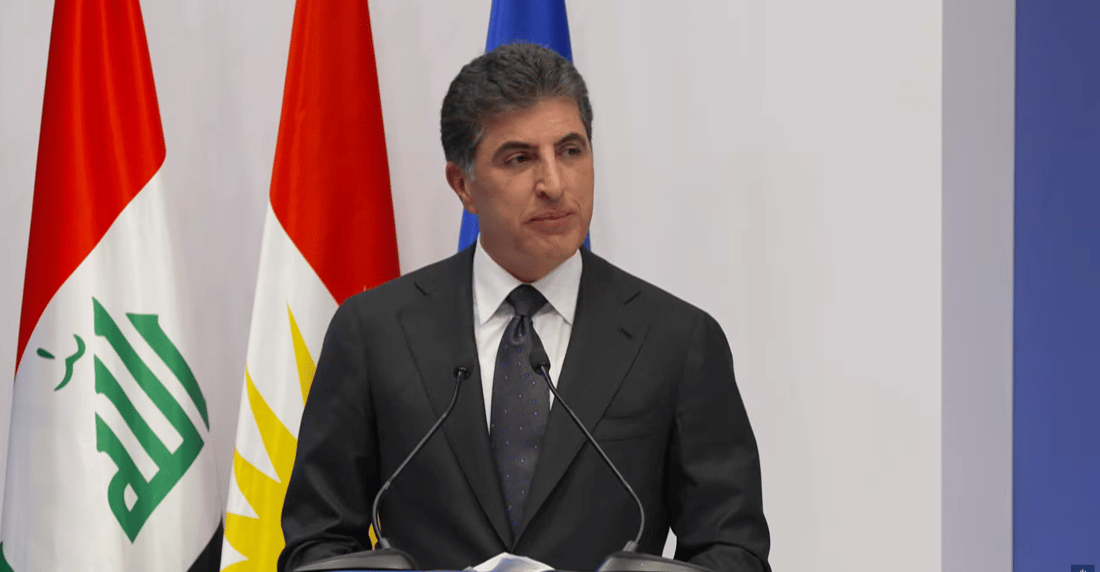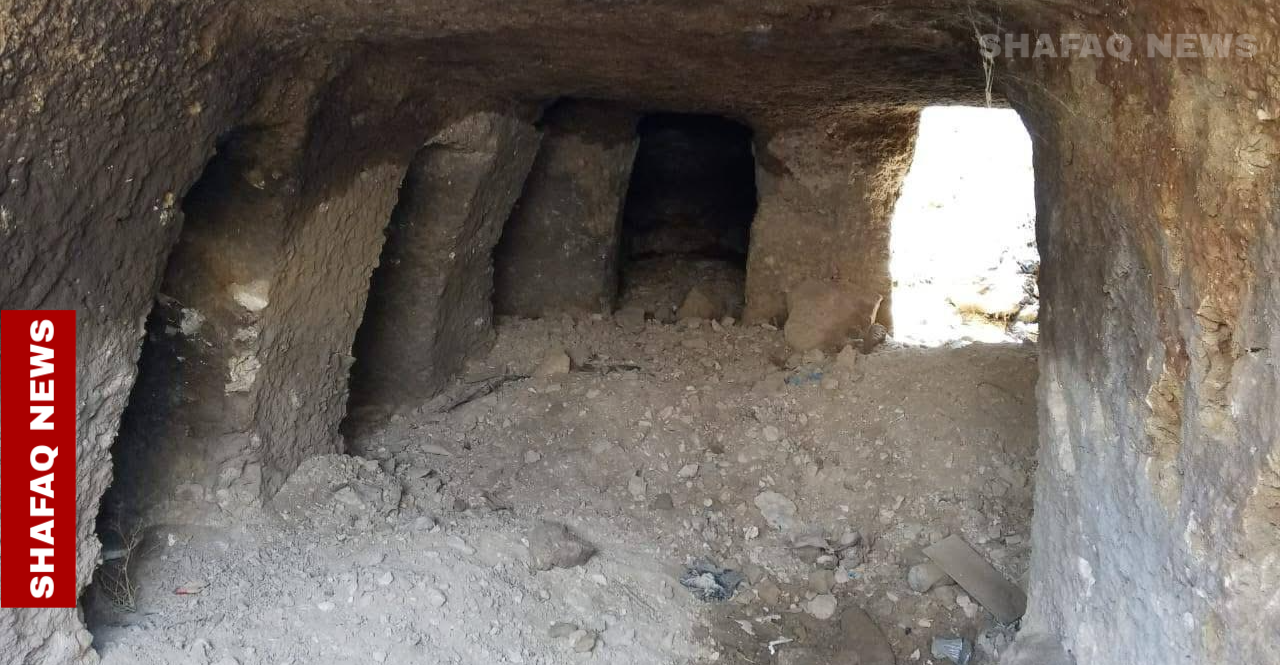Baghdad's shadow play: Syria visit exposes deep Iraqi political rifts

Shafaq News/ The recent unannounced visit of Syrian Foreign MinisterAsaad al-Shibani to Baghdad on Friday, after multiple delays, has drawnattention to the evolving dynamics between Iraq and Syria. According toanalysts, the visit was aimed at easing tensions, fostering betterunderstanding, and reassuring Iraq that Syria will not pose a threat to itssecurity.
Delays and Regional Pressures
The visit had initially been planned for an earlier date but was delayedseveral times, with the official reasons for the postponement remainingunclear.
Political analyst Mujashaa al-Tamimi attributes these delays to thesignificant regional and international pressures on Iraq, particularly from theUS and Iran. “This external influence has created a division within Iraq'spolitical landscape, particularly regarding its stance on Syria.”
Al-Tamimi explains that some factions, particularly those aligned withIran, have resisted closer ties with Syria, viewing the new Syrianadministration as a setback for the Iranian axis. In contrast, other groups,particularly Sunni forces, support Syria’s political changes and back theremoval of Bashar al-Assad’s regime.
Divided Iraqi Discourse
The discourse surrounding the visit highlights the divide in Iraq'spolitical approach to Syria. The Iraqi government, in line with the officialstance, considers the Syrian conflict an internal matter and insists that Iraqshould not intervene in Syria’s affairs, despite the popular sentiment in Syriacalling for Iraq’s involvement.
On the other hand, Shiite political forces in Iraq view the changes inSyria as a significant loss for Iran and, as a result, oppose normalizationwith the new Syrian government.
Meanwhile, Sunni political factions, particularly those aligned with theUS and its allies, have supported Syria’s political shift and are advocatingfor the removal of Al-Assad’s regime.
Mokhtar al-Moussawi, a member of the Al-Fatah Alliance headed by Hadial-Amiri, declared his rejection of rapprochement with the Syrianadministration, considering that “the new Syrian administration is not agovernment because it is accused of sectarianism, executing foreign agendas,and making wrong decisions and steps.”
Al-Moussawi, who is a member of the Foreign Relations Committee in theIraqi Parliament, said in an interview with Shafaq News Agency that “the Syrianadministration is imported from abroad, and it will not last long. We will notsit with them, even if an agreement is reached between the two countries.”
This position contrasts with the earlier statement by Iraqi ForeignMinistry Deputy Minister Hisham al-Alawi in which he revealed that the Iraqigovernment has opened up to the transitional administration in Syria. Hementioned that their representatives attended meetings in Paris and Riyadh, andarrangements are being made for a meeting in Brussels.
Iraq’s Balanced Stance
Al-Tamimi also notes that the Syrian conflict is part of a broader USstrategy in the region, and Iraq, like other countries, cannot oppose thisstrategy without facing consequences. Therefore, despite Iraq’s internaldivisions, the government has avoided taking an overtly oppositional stancetoward Syria. Instead, it has engaged diplomatically, including sending thehead of intelligence to Damascus and hosting Foreign Minister al-Shibani inBaghdad, “signaling Iraq’s cautious approach to balancing regional andinternational pressures.”
The secrecy surrounding the visit was also a strategic decision.According to a source in the Syrian government, the visit was kept confidentialto avoid security risks to al-Shibani and prevent potential political backlashfrom Iraqi factions opposed to Syria.
The Coordination Framework, a key political force in Iraq, has beenvocal in its opposition to closer ties with Syria, making the discreet natureof the visit a necessary step to prevent media and political campaigns againstit.
Reassurance and Security Cooperation
The visit's central message was to reassure Iraq that Syria would notuse its territory as a staging ground for threats against Iraq, according toSyrian political analyst Yaman Shawaf.
Shawaf reiterates to Shafaq News Agency that al-Shibani's visit is partof an effort to establish reassurance that Syria will not be a threat to Iraq,emphasizing the importance of coordination to protect borders and reducetensions between Damascus and Baghdad.
He points out that concerns about the Syrian administration were notlimited to Iraq alone, as many countries shared Baghdad's concerns, especiallyregarding the transformation of al-Julani into al-Sharaa. “However, Damascushas worked to allay the fears of other countries, leading to significantAmerican and European diplomatic visits to Damascus. This reflects theinternational and Arab community's desire to work toward stability in Syria andrecognize the current government while monitoring its actions.”
In turn, Syrian researcher and writer Bassam al-Suleiman, states, “It iscrucial to restore relations between Iraq and Syria, especially given the manyforces in both countries pushing for this direction. Baghdad is a depth forDamascus, and vice versa.”
Suleiman adds to Shafaq News Agency, “The two countries are brothers,regardless of the negative situation created by Iran and the former Syrianregime in the region. Therefore, Iran and its proxies should not be allowed toseparate the two peoples, who have ties dating back to before Islam.”
Al-Shibani’s comments at the press conference with Iraqi ForeignMinister Fuad Hussein underscored Syria’s commitment to strengthening its tieswith Iraq. He emphasized that both countries should stand together against anyexternal interference in their internal affairs and reiterated Syria’s desireto boost economic and trade relations with Iraq.
Security and Political Discussions
In addition to economic ties, the discussions focused on joint securityefforts, particularly in combating ISIS, which remains a common threat for bothIraq and Syria.
Minister Hussein noted the shared challenges both countries face indealing with ISIS and mentioned the idea of forming a joint operations room tocombat ISIS terrorism. He also expressed Iraq's hope for a political process inSyria that includes all of the country’s components, warning that excluding anygroup could lead to further instability.
Hussein also mentioned that a cooperation council between Iraq and Syriacould be established to address security, political, economic, and diplomaticissues. These discussions, according to sources, centered on practicalmechanisms for cooperation, including border security and joint efforts toaddress the continued spread of terrorist groups in the Syrian desert.
As Syria works to re-establish itself regionally, Iraq’s cautiousengagement demonstrates its desire to maintain stability and security in avolatile environment. This visit, though discreet, represents a step towardenhanced cooperation between the two countries, especially in addressingsecurity challenges and fostering economic ties. However, Iraq's dividedpolitical climate suggests that this engagement will remain a delicatebalancing act, shaped by both domestic and external forces.




